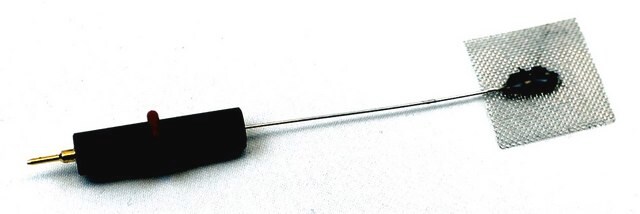GF97671415
Eisen
rod, 500mm, diameter 4.8mm, as drawn, 98+%
Synonym(e):
Eisen
Anmeldenzur Ansicht organisationsspezifischer und vertraglich vereinbarter Preise
Alle Fotos(2)
About This Item
Lineare Formel:
Fe
CAS-Nummer:
Molekulargewicht:
55.85
MDL-Nummer:
UNSPSC-Code:
12352300
PubChem Substanz-ID:
NACRES:
NA.23
Empfohlene Produkte
Assay
≥98%
Form
rod
Hersteller/Markenname
Goodfellow 976-714-15
Widerstandsfähigkeit
9.71 μΩ-cm
bp
2750 °C (lit.)
mp (Schmelzpunkt)
1535 °C (lit.)
Dichte
7.86 g/mL at 25 °C (lit.)
SMILES String
[Fe]
InChI
1S/Fe
InChIKey
XEEYBQQBJWHFJM-UHFFFAOYSA-N
Allgemeine Beschreibung
For updated SDS information please visit www.goodfellow.com.
Rechtliche Hinweise
Product of Goodfellow
Analysenzertifikate (COA)
Suchen Sie nach Analysenzertifikate (COA), indem Sie die Lot-/Chargennummer des Produkts eingeben. Lot- und Chargennummern sind auf dem Produktetikett hinter den Wörtern ‘Lot’ oder ‘Batch’ (Lot oder Charge) zu finden.
Besitzen Sie dieses Produkt bereits?
In der Dokumentenbibliothek finden Sie die Dokumentation zu den Produkten, die Sie kürzlich erworben haben.
Thomas A Russo et al.
Infection and immunity, 82(6), 2356-2367 (2014-03-26)
Hypervirulent (hypermucoviscous) Klebsiella pneumoniae (hvKP) strains are an emerging variant of "classical" K. pneumoniae (cKP) that cause organ and life-threatening infection in healthy individuals. An understanding of hvKP-specific virulence mechanisms that enabled evolution from cKP is limited. Observations by our
Laura M van Staalduinen et al.
Proceedings of the National Academy of Sciences of the United States of America, 111(14), 5171-5176 (2014-04-08)
The enzymes PhnY and PhnZ comprise an oxidative catabolic pathway that enables marine bacteria to use 2-aminoethylphosphonic acid as a source of inorganic phosphate. PhnZ is notable for catalyzing the oxidative cleavage of a carbon-phosphorus bond using Fe(II) and dioxygen
Eunna Choi et al.
Infection and immunity, 82(6), 2203-2210 (2014-03-20)
In order to survive inside macrophages, Salmonella produces a series of proteins encoded by genes within Salmonella pathogenicity island 2 (SPI-2). In the present study, we report that Fur, a central regulator of iron utilization, negatively controls the expression of
Hypoferremia of infection: a double-edged sword?
Kristen L Lokken et al.
Nature medicine, 20(4), 335-337 (2014-04-09)
Don-Kyu Kim et al.
Nature medicine, 20(4), 419-424 (2014-03-25)
In response to microbial infection, expression of the defensin-like peptide hepcidin (encoded by Hamp) is induced in hepatocytes to decrease iron release from macrophages. To elucidate the mechanism by which Salmonella enterica var. Typhimurium (S. typhimurium), an intramacrophage bacterium, alters
Unser Team von Wissenschaftlern verfügt über Erfahrung in allen Forschungsbereichen einschließlich Life Science, Materialwissenschaften, chemischer Synthese, Chromatographie, Analytik und vielen mehr..
Setzen Sie sich mit dem technischen Dienst in Verbindung.


